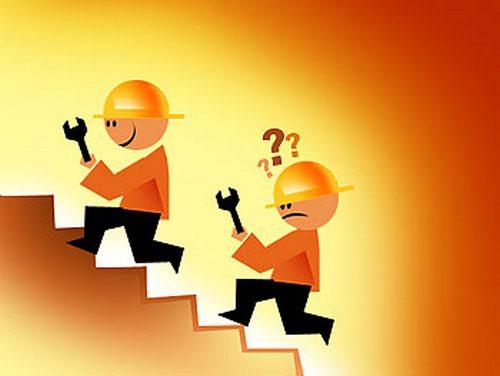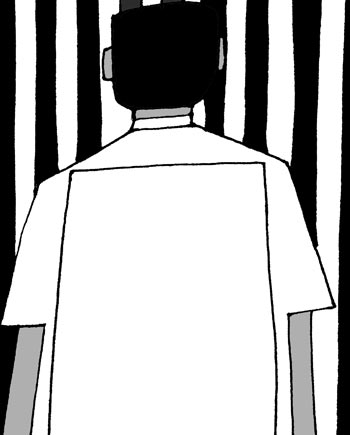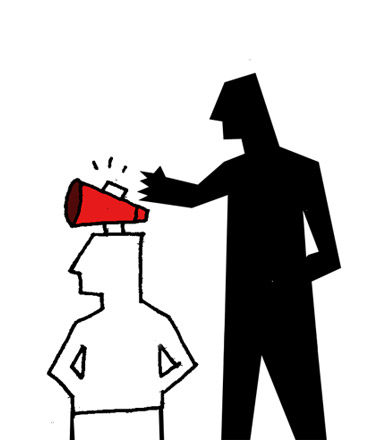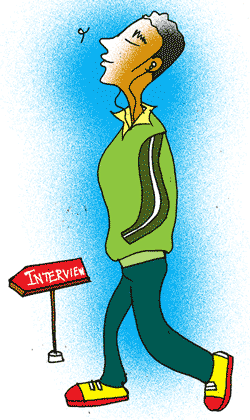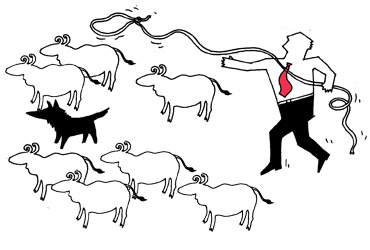 | « Back to article | Print this article |
14 common interview mistakes to avoid
In the first part, Charanpreet Singh, Associate Dean, Praxis Business School, Kolkata listed 15 common blunders most people make at an MBA Interview. Here, he tells you 14 more things to avoid at a B-school interview. Illustrations by Uttam Ghosh/Dominic Xavier
1. Being closed-minded and/ or judgemental
While we just discussed that it is good to have an opinion, being intolerant of other points of view is a sign of a closed person.
If you judge others and fail to accommodate their way of looking at things, chances are that you will fail as a team player (and later as a team leader).
Your answers should therefore reveal an appreciation of the fact that other, valid perspectives do exist.
For Rediff Realtime News on MBA Admissions, Click Here
2. Yielding to stress
The panel is quite capable of subjecting you to stressful situations to assess your ability to handle stress.
You need to pass this test; ensure that you retain your composure and not get emotional or aggressive.
Keep your focus on the question(s) asked and don't let the situation overpower you.
3. Exposing your disregard for ethics
The panel often conjures up circumstances that face you with ethical dilemmas. This is tricky.
Candidates who pick what they term 'practical' (essentially unethical) options are perceived as people who will take short-cuts to success.
Remember, some principles in life are absolute and independent of the circumstances. Handle such situations with consistency across examples in an assertive manner.
4. Not having a couple of good questions to ask
Towards the end of the interview, the candidate is usually given the opportunity to ask a few questions of the panel.
It is profitable to have a couple of good questions ready -- these would typically have to do with certain aspects of the institute and its curriculum and should portray, a sound knowledge of the school; asking no questions is of course a better option than asking stupid questions.
'How have I fared in the interview?' is a very stupid question, but 'Have I made it?' is stupider!
5. Making wild, uneducated guesses
Or not having the ability to say 'I don't know'.
However rigorous your preparation, it may happen that you don't have answers to a couple of questions.
Admit to the panel that you don't know.
If you think you may be close but are not sure, tell the panel that you are making an educated guess. If you think you can work out the answer, ask for some thinking time from the interviewers.
Do not follow a policy of 'spray and pray' -- i.e., make wild guesses and pray that you are somewhere close to the actual answer.
6. Refusing to apply your mind
Intelligent interviewers ask several questions that test the interviewee's ability to use his/ her analytical ability to 'work out' the answer.
A candidate who depends solely on knowledge and is not willing to use his/ her thinking cap runs the risk of faring poorly in such situations.
Train yourself to think on your feet and not give up easily.
Sometimes your answer may not be the ideal one -- but the panel is more interested in understanding your thought process.
7. Underestimating the importance of body language
Your posture, extent of eye-contact (which must sweep the entire panel), use of hands while speaking, etc reveal a lot about you.
Shaking your legs, fidgeting with a pen, playing with your hair, tapping your fingers, etc are signs of lack of confidence.
It is therefore perilous to not be aware of how you present yourself to the panel.
8. Trying to be someone else
It is essential for you to be comfortable with yourself; candidates sometimes try to present themselves as who they would want to be rather than who they really are.
Understand yourself, your strengths and weaknesses, and present yourself as the person you are. If you have some shortcomings, academic or other, own up to them.
The fact that you have reached the interview stage implies that you are ready to improve and move forward in life.
9. Being too informal and/ or familiar with the interviewers
While it is good to not be unnecessarily stiff and be comfortable with the panel, candidates sometimes make the mistake of becoming over-familiar with the interviewers.
This is an attempt to reduce stress levels, but you have to draw the line firmly between being conversational and being cocky.
It is imperative to be formal with and respectful of the panel -- after all they would be your professors in the near future.
10. Lacking consistency in your responses
A smart panel will ask you the same question in several ways.
Your answers should reflect a consistent line of thought.
For example, your responses to questions like 'why do you want to pursue an MBA?', 'what are your short and long-term career goals? ' and 'where do you see yourself 5/7/10 years from now?' should be pretty much the same.
11. Making assertions without proper support
As an example, when quizzed about strengths, a majority of candidates mention 'leadership quality.'
The panel is bound to dig deeper and understand why you think you are blessed with this trait. In such a situation, the inability to support your claim with substantial evidence makes you end up looking a little silly.
Be careful when you make such pronouncements -- ask yourself the question -- if the panel asks me the corresponding how's and why's, will I be in a position to defend myself?
12. Failing to differentiate yourself
The level of competition for the top schools is fierce; there is an over-supply of good candidates and you need to differentiate yourself.
Personal questions give you an opportunity to stand a#8706 if your best strength is that you are 'good with people' then let me tell you that I have not met any candidate in my rather long life as an interviewer who does not think he/ she is 'good with people'!
Is there something you have done that takes being 'good with people' to a level beyond having many friends all of whom depend on your wisdom to settle their lives' problems?
Or, do you have a characteristic, supported by examples that demonstrate its existence, which is not so commonplace?
Think hard about who you are as an individual and I am sure you will find these differentiators.
13. Coming across as arrogant and/ or irreverent
MBAs are often perceived as a community of arrogant and presumptuous people, and b-schools are often accused for nurturing this attitude.
Professors, almost as a rule, detest students who are supercilious and have over-inflated egos.
You need to come across as a dignified, polite and grounded person. If you appreciate the erudition and wisdom of the members of the panel, you will automatically feel humbled.
14. Lying
We started by saying that you are likely to be picked if the panel 'likes' you.
I thought I would end with perhaps the most decisive 'don't.'
The moment the interviewers find out that you have lied to them, you have ruined any chance that you may have had to clear the final stage.
No b-school wants to fill its seats up with frauds and liars (there are any way too many such people in the country and the world).
Speak the truth; if your poor marks are a result of lack of focus/ work, admit it. If you have a job offer from the campus or have applied to competing schools, tell the panellists if they ask.
They are smart enough to figure out who is lying.
Remember, you may need to tell many lies to cover one -- all this builds up stress levels as you are constantly trying to create an unreal story.
If you stick to the facts, your confidence levels will be higher and you will come across as an honest, earnest individual -- the dream catch for any good institution.





